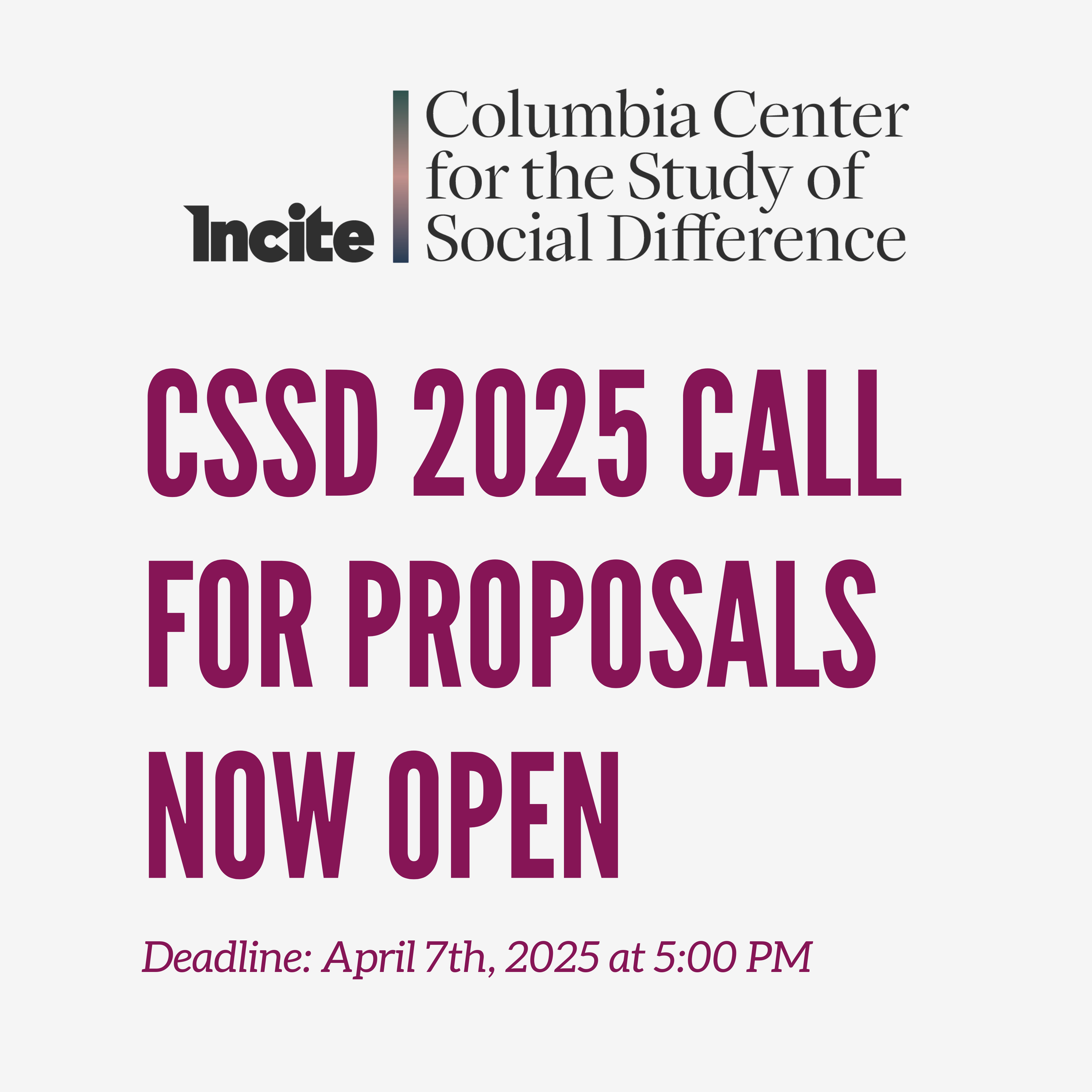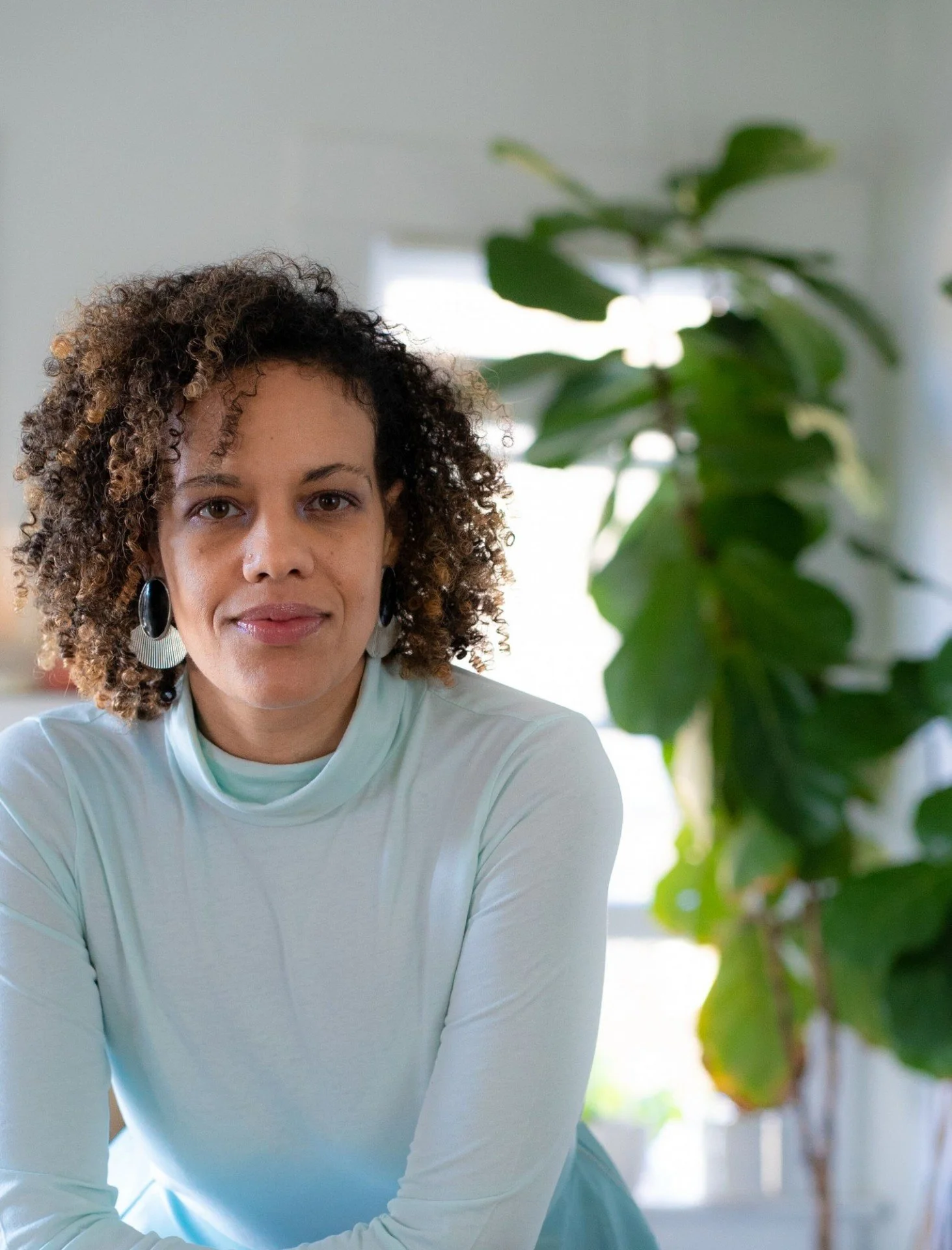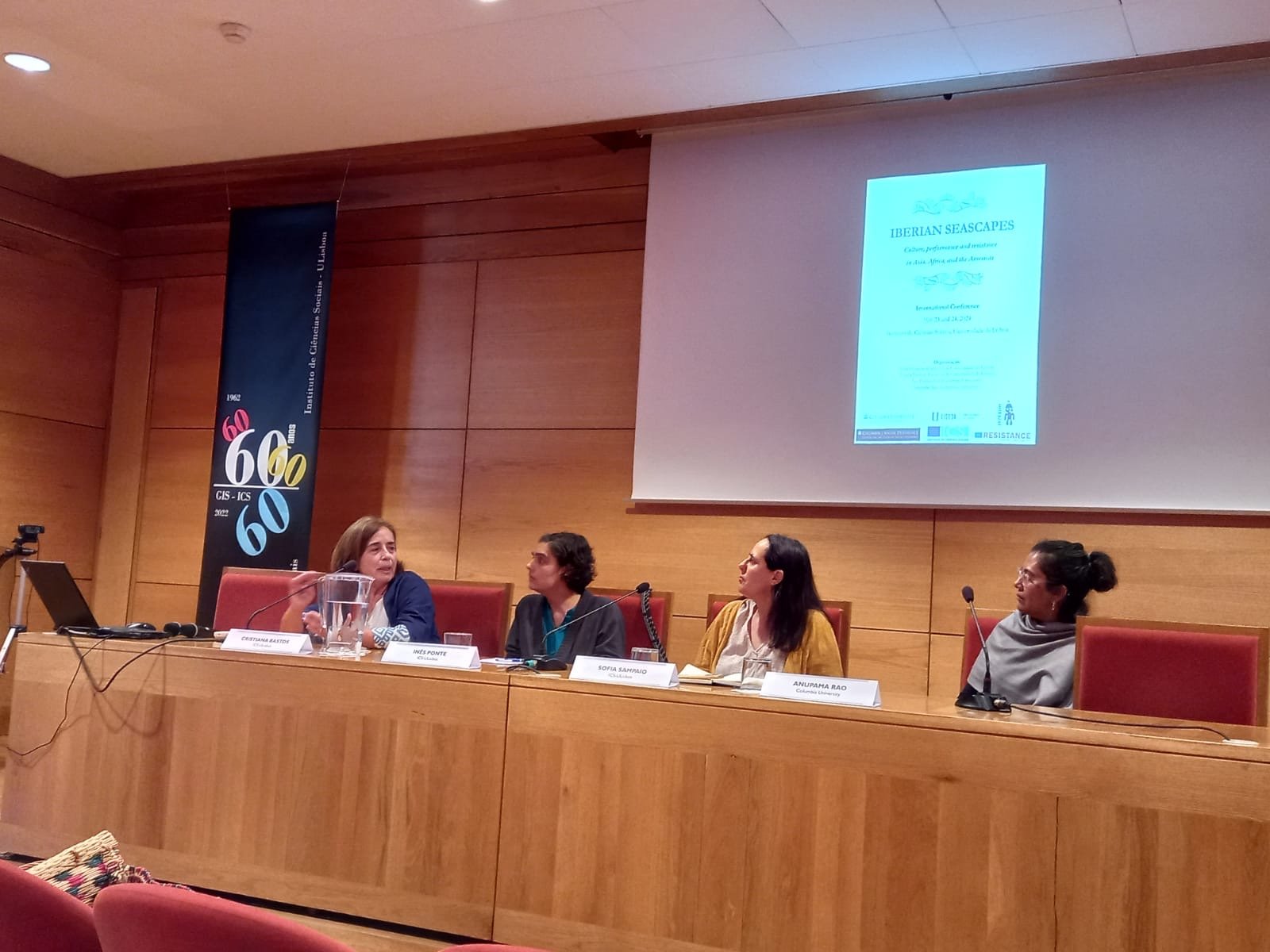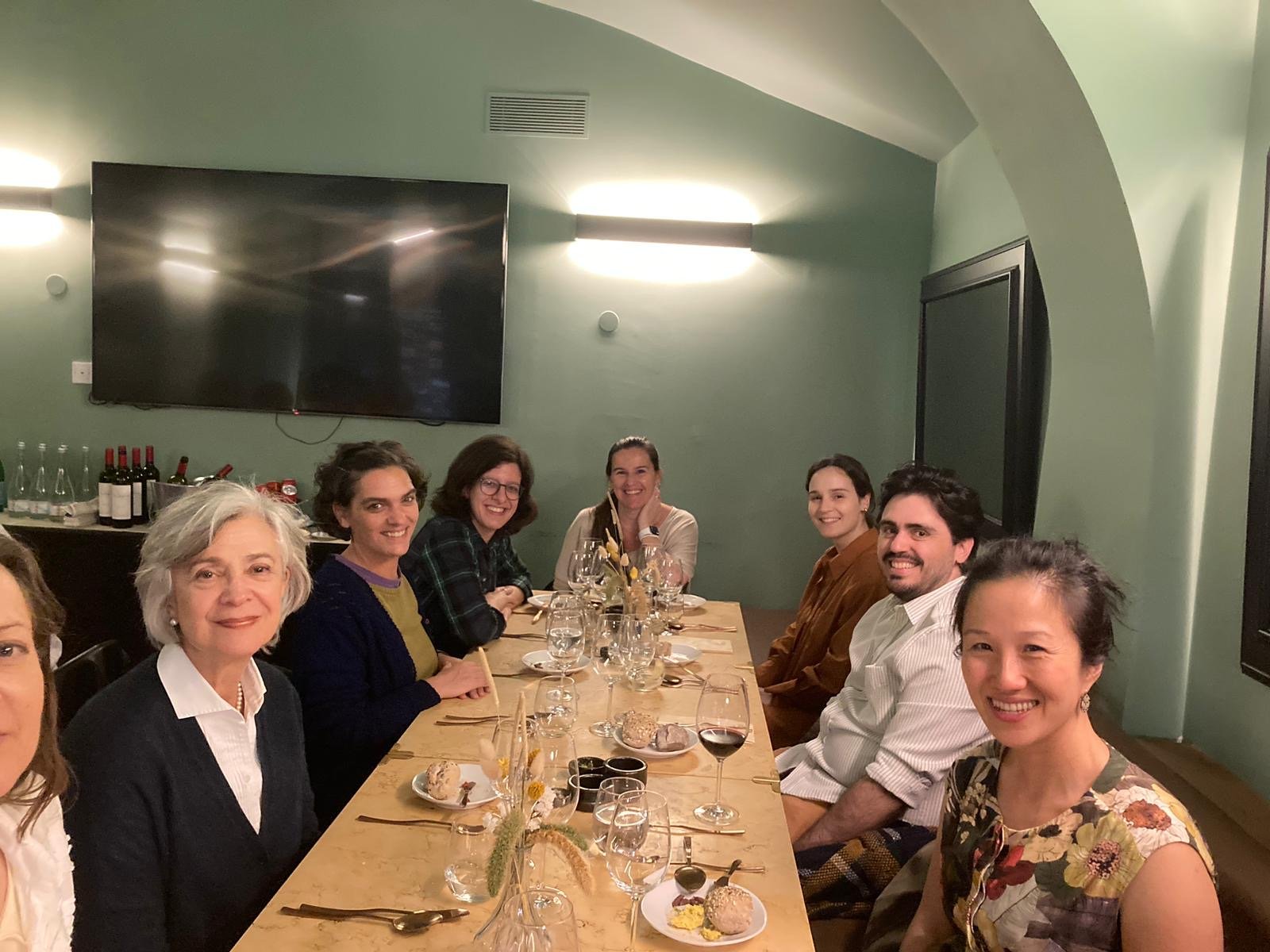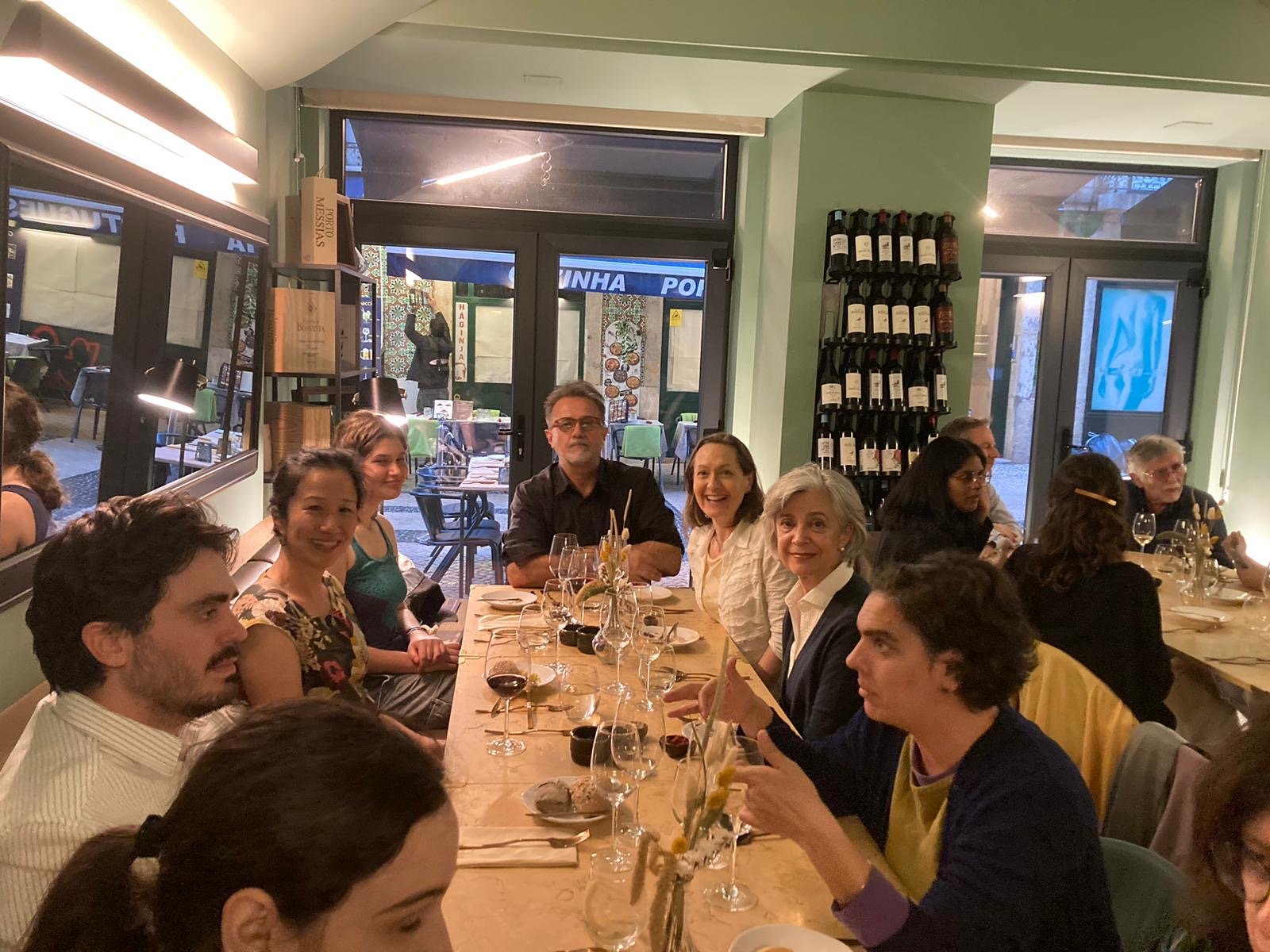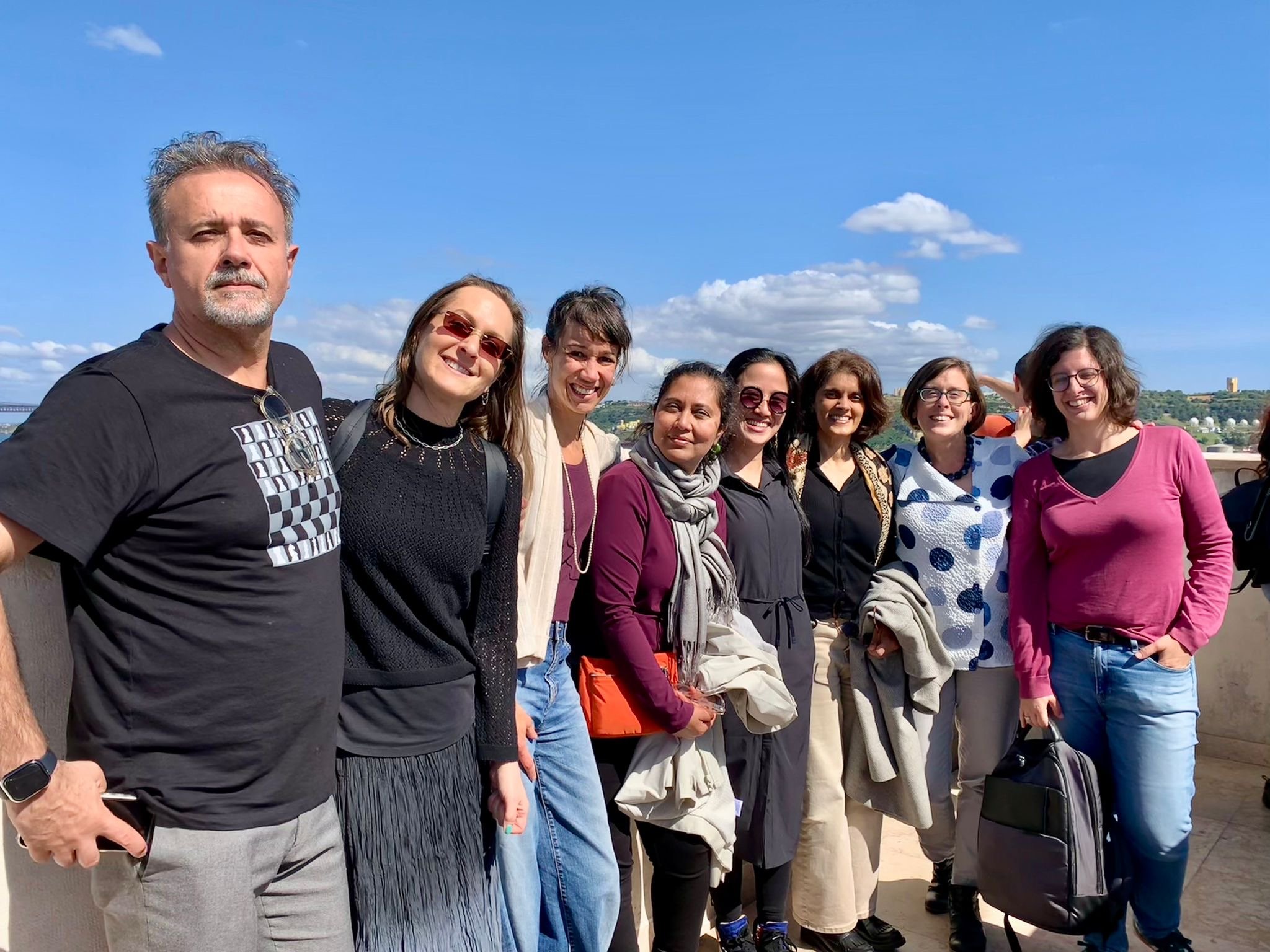
CSSD CALL FOR PROPOSALS!
The Center for the Study of Social Difference at Columbia University (CSSD) welcomes proposals for NEW WORKING GROUPS to begin in Fall 2025.
Submission Deadline: Monday, April 7, 2025 by 5:00 PM
CSSD is an interdisciplinary research center supporting collaborative projects that address race, class, gender, sexuality, and other forms of inequality to foster ethical and progressive social change. Over the next two years, the Center will support research working groups and develop public programming around the theme of “Crisis,” engaging with the proliferation of crises in the present and probing how experiences of crises are highly different and unequal among social groups. Learn more about this thematic focus here and the Center’s ongoing and past projects here.
CSSD brings together faculty in the humanities, law, social sciences, sciences and arts, as well as artists and practitioners in the New York area and beyond, to investigate problems of social, economic, and cultural inequality. The Center’s working groups challenge disciplinary divides, asking how historical and contemporary categories of social difference and identity shape institutions and policies, lived experiences, global relations, and art and activism. The Center creates the conditions for researchers to work collaboratively and internationally on problems of common interest and to set intellectual agendas for the future; it places emphasis on public programming and scholarship to engage wider audiences. CSSD is newly housed under Incite Institute at Columbia University.
Who is eligible:
CSSD seeks projects that align with the Center’s thematic focus on “Crisis” and favors proposals from interdisciplinary core working groups (usually 5-8 people, not all of whom have to be Columbia or Barnard faculty). Please note that at least one core working group member has to be Columbia or Barnard faculty.
Most, but not all, CSSD working groups are led by two or more co-directors. At least one (co-)director must be Columbia or Barnard faculty and proposals must be submitted by one or more faculty members in one of Columbia's schools and/or Barnard. Co-directors will be responsible for administering the working group’s meetings and coordinating their public events (with support from CSSD).
We will also review working group proposals from graduate students with ABD status who are working in partnership with Columbia and/or Barnard faculty.
CSSD accepts proposals from all schools of Columbia and Barnard, including but not limited to Arts & Sciences, CUMC, School of the Arts, Columbia Law School, School of Journalism, and GSAPP, with preference given to groups working across schools and/or disciplines.
The Center encourages and facilitates projects involving international collaborations, though it is strongly advised that additional funding is secured in such cases.
Directors of working groups that have received funding from the Center in the last 5 years are not eligible to apply to lead a new working group but can be among its members.
Amount of award:
Funding is in the amount of $40,000 over two years. Funds are administered directly by CSSD staff for the duration of the working group’s project through various payment methods, including but not limited to staff reimbursement and promissory notes. Groups can apply for a third year extension that could include $10,000 in funding for the year. This is contingent on working group developments and on the availability of Center funds and is at the discretion of the Center’s Executive Committee. It is also possible to apply for a no-cost extension. Center support is seed money to enable working groups to get off the ground; it is the expectation of the Center that all projects will also seek additional funding. Project directors must be willing to collaborate in the Center’s fundraising efforts and should be prepared to work with the Center to seek additional funding sources.
How CSSD working groups function:
Center projects typically run for two years. Every working group proceeds in accordance to the needs of its particular research interests, but in general many groups tend to proceed as follows:
Year one generally concentrates on focused project development, including the consolidation of a regional and/or international working group, seminars, workshops, and exploratory events. Year two involves the most intensive intellectual work, featuring regular meetings of the working group, and more developed public programming that disseminates the group’s research.
Selected working groups are required to organize at least one event open to the public per year and are expected to partake in the public programming organized by the Center and its other working groups. CSSD is particularly interested in working groups that propose out-of-the box formats for their programming and exciting ways to engage with communities and audiences outside of the academy. Potential programming formats to consider include site-specific conversations, field trips, exhibitions, walks, radio or podcast shows, reading circles, online documentary projects, and pamphlet publications.
Please note: CSSD does not function simply as a grant-making institution. Our active working groups create the CSSD community. The Center works closely with its working groups on the administration of project funds as well as on building additional collaborations and sharing other funding opportunities. It is expected that one (co-)director from each active working group will sit on the CSSD Executive Committee, a decision-making body that meets 2-3 times per semester and collaborates in the creation of the Center’s vision.
Current and past working group projects, which focused on the research streams of “Women Creating Change” and “Imagining Justice,” include “Alternative Modes of Being,” “Creative Resistances: Arts and Activism in the Americas,” “Seeds of Diaspora,” “Afro Nordic Feminisms,” “Refugee Cities: Urban Dimensions of Forced Displacement,” “Extractive Media: Infrastructures and Aesthetics of Depletion,” “Recovery,” “Motherhood and Technology,” and “Insurgent Domesticities,” among others. Please review our website for detailed descriptions of all our supported projects.
Use of funds:
CSSD project support budgets may be used by project directors at their discretion. However, budgets typically include the following:
Course relief for a project director (one course per year for two years, alternating in the case of co-project directors; specific terms to be negotiated by the individual project director with the director’s home department and/or center/institute);
Stipend for one graduate student assistant responsible for program support;
Occasional stipends for additional graduate/student fellows;
Working group meeting lunches and/or breakfasts;
Support for public programming.
CSSD project funds are modest, and we do not support honoraria or stipends paid to members of the core working group. Honoraria may be offered to event speakers or special guests from outside Columbia and the core working group who are invited to present or share information to the group or the public.
How to apply:
Project proposal narratives should not exceed five double-spaced pages and should include a project description and a detailed work plan for group meetings, public events, and publications. The project description should entail information on how the group plans to engage with the theme of ‘Crisis’ and the intellectual and social implications of this engagement.
Proposal narratives should also describe a plan for expanding working group membership by adding members from the wider University community, as well as any anticipated curricular or pedagogical outcomes of the proposed project.
Please also include, in addition to the above:
a short CV or bio for each tentative working group member – e.g., one paragraph summary bios (indicate if participation has been confirmed or not)
proposed budget (please download the provided budget template)
Staff are available to discuss potential projects with colleagues thinking about proposing them, and sample CSSD project proposals are available by request. Please write to Dr. Nadia Christidi at with any questions as you develop your proposal. A Q&A will also be hosted by CSSD on 12th March which applicants are invited to attend. We encourage you to contact us in advance of submitting your proposal. Complete proposals should be emailed to Nia Paz-Díaz by Monday, April 7, 2025 at 5:00 PM, with the subject line CSSD Proposal 2025. Projects will be selected by the CSSD Executive Committee. Selection criteria include the proposal’s alignment with the Center’s mission of addressing inequality; the strength, coherence, and originality of the proposed research; the innovativeness of the proposed programming; the proposal’s engagement with the theme of crisis; the interdisciplinary breadth of the working group; and additional funding application plans. All applicants will be notified by Monday, April 21, 2025.
Afro-Nordic Feminisms Working Group goes to University of Iceland
Several members of the Afro-Nordic Feminisms working group presented their research at the "Pedagogies of Reckoning" seminar at the University of Iceland. Oda-Kange Diallo and Elizabeth Lowe Hunter discussed "Pedagogies of Togetherness: Black Study and Diasporic Consciousness in the Nordic Region." Benjamin Mier-Cruz presented "Diffracting the Colonial Lens: Teaching Nordic Cinema in the United States." Ellen Nyman shared her work on "Adopting Acting Techniques," and Faith Adiele spoke on "Arrival of the Afro-Vikings: The Challenge of Decolonizing Travel Writing." The three-day seminar focused on pedagogy and colonialism in the Nordic region.
Truelove Seeds Tour: Seeds of Diaspora
On October 18th, the Seeds of Diaspora working group visited Truelove seeds, a seed farm and consolidator of heirloom seeds in Glen Mills, PA. Owen Taylor, pictured at center, described their efforts to package and distribute diaspora seeds provided by culturally diverse community gardens across the US. Unlike other commercial seed catalogues, Truelove focuses on helping these groups to sustain the cultural practices and food traditions that exist in mutuality with the seeds they preserve. In gorgeous fall weather, we toured Truelove's heritage gardens of plants from Palestine, Mexico, and Southern Africa, amongst other places, which are being propagated and harvested in direct collaboration with the diasporic communities that maintain long standing relationships with them. While there, we also met seed farmers, seed-savers and permaculture practitioners visiting from New York and New Jersey, and were able to lend a hand with processing Mexican marigolds for Day of the Dead festivities (see picture below). We are planning collaborations with Truelove seeds into the future, including organizing a public symposium/workshop on seed-saving at Columbia in the spring.
Working group members at Truelove Seeds Farm, Glen Mills, PA.
Columbia Giving Day is Here on October 1,2024! Save The Date.
Columbia Giving Day x CSSD , October 1, 2024
The Center for the Study of Social Difference creates space for faculty to address emerging issues and cultivate partnerships across the Columbia University campus, within the United States, and overseas. Our faculty members are deeply committed to advancing the boundaries of knowledge and fostering creation in their respective fields.
We could not do this work without your help. Support CSSD this Columbia Giving Day on
October 1, 2024
The Recent Work of Dr. Nancy Reame from the Motherhood and Technology Working Group
* Upson K. Hall MS, Shearston J, Schilling K, Yan B, Reame N, Talge N, Schertzing C, Kioumourtzoglou MA. Tampon use as a source of toxic metal exposure: Results from NHANES 2001-2004. 36th Annual Meeting of the Society for Pediatric and Perinatal Epidemiologic Research, Portland Ore, June 12-13, 2023.
* Gordián-Arroyo A, Reame N, Gutierrez J, Liu J, Ganzhorn S, Igwe KC, Laing K, Schnall R. Do correlates of white matter features differ between older men and women living with human immunodeficiency virus? Menopause. 2023 Feb 1;30(2):149-155.
CSSD Welcomes Professor Shana Redmond as our New Faculty Director
CSSD is thrilled to welcome Professor Shana L. Redmond as our new Faculty Director. Professor Redmond (she|her) is Professor of English and Comparative Literature and holds a joint position at the Center for the Study of Ethnicity & Race (CSER), one of CSSD’s five partners. A writer and interdisciplinary scholar of race, culture, and power, she is the author of Anthem: Social Movements and the Sound of Solidarity in the African Diaspora (NYU Press, 2014) and Everything Man: The Form and Function of Paul Robeson (Duke UP, 2020), which received a 2021 American Book Award from the Before Columbus Foundation with the special citation of the Walter & Lillian Lowenfels Award for Criticism. Named a “Best Book of 2020” by National Public Radio (NPR), Everything Man received multiple awards including the Irving Lowens Book Award from the Society for American Music and the Judy Tsou Critical Race Studies Award from the American Musicological Society. In addition to being co-editor of and contributor to Critical Ethnic Studies: A Reader (Duke UP, 2016), she is co-editor of the University of California Press series “Phono: Black Music and the Global Imagination.” She has published chapters, articles, and essays in outlets including The Futures of Black Radicalism, Current Musicology, Black Camera, Black Music Research Journal, Race & Class, Women & Music, and Brick: A Literary Journal as well as NPR, the BBC, Boston Review, and Mother Jones. Her work with artists and labels includes the critical liner essay to the soundtrack vinyl release for Jordan Peele’s film Us (Waxwork Records, 2019) as well as the notes for String Quartets, Nos. 1-12 by Wadada Leo Smith (TUM Records, 2022) and Nina Simone’s You’ve Got to Learn (Verve, 2023).
Professor Redmond’s current project is a forensic listening to Black life before mourning, a book she has been researching and writing this past year as a 2023 Guggenheim Fellow. Shana Redmond brings not just her academic and artistic vision to CSSD but also extensive leadership experience, most notably in her three-year presidential term with the American Studies Association (2021-2024).
“I am deeply committed to collaborative study; I see its need and believe in its transformative potential. It is that focus on collaboration in thought within CSSD that drew me to this position and I look forward to the insights and knowledge that our working groups and programming will produce.”
- PROFESSOR SHANA L. REDMOND
Members of the Afro-Nordic Feminisms WG Participate in Panel at the Society for the Advancement of Scandinavian Studies Conference in Seattle (May 9-12, 2024)
Members of the Afro-Nordic Feminisms Working group participated in a panel at the Society for the Advancement of Scandinavian Studies Conference in Seattle, held this year May 9-12, 2024.
The Working Group’s primary goal was to bring attention to issues often overlooked in these spaces. This year's SASS coincided with the National Nordic Museum's exhibition "Nordic Utopia? African American Artists in the 20th Century." Our panel followed a discussion on the exhibition, sparking a meaningful conversation about the history and contemporary cultures of Blackness in the Nordics.
Additionally, we had productive dialogues with indigenous scholars focusing on race and racialization in Greenland and Sápmi. These exchanges were invaluable in broadening the scope of our discussions.
Click Here to read the full blog post!
Geographies of Injustice WG Organized and Participated in "Iberian Seascapes" Conference at the University of Lisbon: (May 23-4, 2024)
The Geographies of Injustice Working Group organized and participated in a two-day conference at the University of Lisbon (Portugal), titled “Iberian Seascapes: Culture, Performance, and Resistance in Asia, Africa, and the Americas” on May 23-4, 2024. This conference follows the tremendously successful “Iberian Soundscapes” Conference also organized by the working group in the fall of 2023.
Scholars from India, Portugal, Brazil, and the United States gathered for a two day conference to discuss themes of race, caste, law, sound, and cinema as it pertains to the "Luso-Hispanic Moment".
READ NOW! Ana Paulina Lee Interviewed for NYT Article on Music Exposing Religious Intolerance in Brazil
Brazil's Anitta faces backlash over her new music video, placing a spotlight on Brazil's religious intolerance and racism issues.
Geographies of Injustice Working Group co-director Ana Paulina Lee is interviewed by the New York Times on the situation in Brazil. Read the full article here.
Seeds of Diaspora Hosts Prof. Eric Verdeil for a Talk Titled "From Earth to Art: Seeing, Acquiescing, and Contesting the Anthropocene" on 4/24/24
On April 24, the Seeds of Diaspora Working Group co-sponsored a talk by Professor Eric Verdeil of Sciences Po, Paris. In his talk, entitled 'From Earth to Art: Seeing, Acquiescing and Contesting the Anthropocene' Verdeil presented his work-in-progress based in Paris and Lebanon, which deals with the metabolism and circulation of soils and excavation materials.
He began by discussing the soil depots that ring Paris, as documented by his PhD student Agnes Bastin who followed the flow of soil through the city. He then moved on to the sites and routes of hauling in Beirut, both for the excavation of sand and gravel for aggregate in concrete construction of new buildings and infrastructure; and for the removal of buildings and infrastructure destroyed in attacks. Verdeil's talk also covered the work of some land artists who've been commissioned by the city of Paris to deal with the soil depots outside the city, especially one near the Charles de Gaulle airport, and referenced the collaborative work of Lebanese artists Joana Hadjithomas and Khalil Joreige , whose 'Unconformities' project was an installation of core sample-like elements that reveal the periodicity of violence and destruction in the city. The setting-in-motion of soils, plants and people was also the subject of work-in-progress talks by working group members Anelise Chen and Lynnette Widder earlier in 2024.
Afro-Nordic Feminisms WG Members Jasmine Kelekay, Lena Sawyer, and Nana Osei-Kofi Authored Chapters in the Newly Published Anthology Antirasismer och Antirasister
Jasmine Kelekay, Lena Sawyer, and Nana Osei-Kofi, authored chapters in the newly published anthology Antirasismer och Antirasister: Realistiska utopier, spänningar och vardagserfarenheter (Anti-Racisms and Anti-Racists. Realistic utopias, tensions and everyday experiences).
Read the press release in English, along with a short description here.
Lena Sawyer and Nana Osei-Kofi’s chapter is called Antirasistisk pedagogik: Motarkivering som social omsorg and Jasmine Kelekay’s is called Afrosvensk aktivism i kölvattnet av Black Lives Matter.
Afro-Nordic Feminisms Co-Directors Monica L. Miller and Nana Osei-Kofi co-authored the introduction to I Talk about It All the Time by Camara Lundestad Joof
Afro-Nordic Feminisms Co-Directors Monica L. Miller and Nana Osei-Kofi co-authored the introduction to I Talk about It All the Time by Camara Lundestad Joof, translated by Olivia Gunn, newly published by the University of Wisconsin Press.
Nana Osei-Kofi & Lena Sawyer co-authored, “Counter Archiving as a Decolonial Pedagogy of Collective Care,” published in Decolonising Social Work in Finland: Racialisation and Practices of Care
Nana Osei-Kofi and Lena Sawyer co-authored, along with Kris Clarke, “Counter Archiving as a Decolonial Pedagogy of Collective Care,” published in Decolonising Social Work in Finland: Racialisation and Practices of Care in March 2024.
Tess Skadegård Thorsen from Afro-Nordic Feminisms WG Co-Authored a Chapter in the New Book: (Farve)blinde vinkler – om racialisering, ulighed og andetgørelse i pædagogisk praksis
Tess Skadegård Thorsen also co-authored a chapter in Danish with Mira C. Skadegård in the new book (Farve)blinde vinkler – om racialisering, ulighed og andetgørelse i pædagogisk praksis. (Colour)Blind angles - on racialization, inequity, and othering in pedagogical practices. Their chapter is called Velmenende og almendannende – Diskrimination, racisme og den gode intention i gymnasieundervisning. (Well-meaning and educational - Discrimination, racism, and good intentions in high-school education.)
Jack Halberstam, Director of Past CSSD WG Queer Aquí & ISSG Faculty Director, Announced as 2024 Guggenheim Fellow
The Center for the Study of Social Difference wishes to congratulate Professor Jack Halberstam, the David Feinson Professor of the Humanities, Department of English and Comparative Literature, Director of the Institute the Study of Gender & Sexuality (ISSG), and Director of the past CSSD Working Group Queer Aquí, has been named a 2024 Guggenheim Fellow.
Read the full ISSG article here.
Mana Kia, Director of the New CSSD WG Alternative Modes of Being, Receives Award for Community Building & Engagement at Humanities Faculty Recognition Awards
The Center for the Study of Social Difference wishes to congratulate Mana Kia, Associate Professor in MESAAS and the director of the new Alternative Modes of Being project starting at CSSD this coming fall, for receiving an Award for Community Building and Engagement at the inaugural Humanities Faculty Recognition Awards.
The awards were presented on March 6, 2024, and honored faculty members in the following categories: Academic Excellence and Community Building and Engagement. Awardees were chosen by Acting Dean of Humanities Bruno Bosteels in consultation with the thirteen Humanities Chairs.
Afro-Nordic Feminisms WG Member Tess Skadegård Thorsen Joins Danish Delegation to Brussels in April
Tess Skadegård Thorsen joined a Danish delegation to Brussels in April 2024, where she met with policy-makers and legislators for discussions on gender, racism, and AI regulation. On 16 April, she also gave a guest lecture at Copenhagen University on the Acts, (arti)Facts, and Politics of Representation in Danish Film.
Extractive Media to Co-Sponsor Event with the South Asia Institute at Columbia
The Extractive Media Working Group at CSSD will be co-sponsoring Camera South Asia II alongside the South Asia Institute as they return this year to host a conversation that takes an expansive view of South Asia and its diasporic geographies. Our renowned roster artists, curators, and scholars probe the relation between aesthetics and politics, migration and memory, be it in post-1990s India or the 19th century oceanic voyages of the subcontinent’s “old diaspora.” Camera South Asia seeks to balance a focus on the contemporary with a long view of the past and to unsettle easy ascriptions of identity or authenticity, be it for individuals or for images.
CSSD Call for Applications for Two Business Office Positions: Communications Coordinator & Events Coordinator
Call for Applications
for ABD Graduate Students
The Center for the Study of Social Difference [CSSD] is looking for two ABD graduate students to join the CSSD Business Office for at least one academic year. We are searching for applicants interested in a cross-disciplinary approach to issues of social difference locally and globally. CSSD works across the University to support faculty Working Groups and social engagement projects that foster ethical and progressive social change. To learn more about CSSD, please visit our website.
Candidates can develop administration skills by working closely with the CSSD staff on Center operations and project management. They should expect to commit 10 hours per week to their roles at the Center.
ADMINISTRATIVE COORDINATOR RESPONSIBILITIES:
Events Coordinator: Primary responsibilities include organizing Working Group requests for meetings, events, and travel
Communications Coordinator: Primary responsibilities include preparing CSSD communication for the newsletter, social media, blog, and annual report
ADMINISTRATIVE COORDINATOR PAY:
The administrative coordinator roles offer an expected total pre-tax salary of $5K/semester (assuming 10 hours per week). It will be paid out hourly through the casual student administrative worker position, or ‘additional compensation’ if holding a Student Officer position simultaneously. The application deadline is May 3, 2024, with qualified candidates contacted or interviewed on a rolling basis. Apply early for the best opportunity for consideration. The start date is Monday, Sept. 2.
TO APPLY:
Applicants should email CSSDassistant@gmail.com the following information by May 3.
Please include CSSD Coordinator Position in the Subject line.
CV and cover letter
1-2 paragraphs describing your interest in working with CSSD, your administrative experience, and expected commitments for the September 2024 – June 2025 term
Name and contact information for three references

